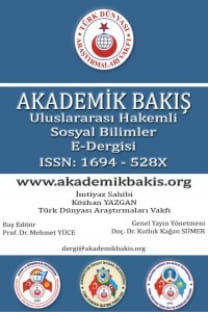AB'NİN AZERBAYCAN POLİTİKASI: ZORLUKLAR, HATALAR VE FIRSATLAR
Çalışmada AB'nin Azerbaycan'a yönelik politikasının etkinliğinin sorun ve başarısızlıkları ele alınmıştır. Çalışma problemlerin AB politikasının yaratıcıları ve onların motivasyonlarından başlamakla daha sonra kavramsal, stratejik ve taktik seviyeler olarak tüm aşamaları kapsadığını savunuyor. Her şeyden önce, Avrupa politikası, Avrupa'nın bölgesel çıkarları ve emelleri doğrultusunda Avrupalılar tarafından kurulmalıdır. Politika sadece genel Batılı yaklaşım çerçevesinde olmamalı ve yumuşak güç ile tek hareketli ikinci derece aktör bir pozisyon almamalıdır. AB\'nin ve Azerbaycanın çıkarlarını koruyan bir şekilde AB\'nin Azerbaycan politikasını optimize mevcut AB-Azerbaycan ilişkilerindeki sorunların çözülmesi ve Azerbaycanın AB\'ye entegrasyonunda önemli bir konudur. Amaç AB\'nin prestij ve cazibesini kurtarmak, AB yapılarına ve yetkilerine Azerbaycan halkının güven ve inancını kazanmak olmalıdır. Entegrasyonu gerçekleştirmek amacıyla, Azerbaycan hükümeti ile toplumun sütunlarının gelişmesi yönünde bir ilişkinin önemi kayd ediliyor.
Anahtar Kelimeler:
AB'nin politikası, Azerbaycan, ilişkiler, entegrasyon, çıkarlar, hükümet
EUs policy for Azerbaijan: challenges, errors and opportunities
This research work is devoted to the study of the problems and failures in the effectiveness of EUs policy towards Azerbaijan. The study argues the problems start from the creators and their motivations for the EUs policy and then covers all stages on these levels: conceptual, strategic and tactical. First of all, European policy should be established by Europeans in the line with Europes regional interests and ambitions. The policy should not be just in the frame of the general Western approach and should not take a position of the second-degree actor moving only with soft power. Optimizing the EUs policy towards Azerbaijan in a manner that retains EUs and Azerbaıjanı interests is a key issue in the resolving of current problems in EU-Azerbaijan relations and the integration of Azerbaijan into the EU. The objective must be to restore the prestige and attractiveness of the EU and the trust and belief of the Azerbaijani people in the EU structures and powers. In order to realize integration, the author suggests a renewal relation with the Azerbaijani government concerning the directions for the development of the pillars of the society.
Keywords:
EUs policy, Azerbaijan, relation, integration, interests, government,
- Başlangıç: 2004
- Yayıncı: Akademik Bakış
Sayıdaki Diğer Makaleler
DÜŞÜNCE ÖZGÜRLÜĞÜNE VERİLEN ÖNEM AÇISINDAN HUKUK SİSTEMLERİNE KAVRAMSAL BİR YAKLAŞIM
ANTİK ROMADA KADIN GLADYATÖRLER
AB'NİN AZERBAYCAN POLİTİKASI: ZORLUKLAR, HATALAR VE FIRSATLAR
Hüsamettin İNAÇ, Uğur ALTUNTAŞ
ETNOGRAFİK MALZEMENİN SANATSAL KULLANIMI: ALANDAN SAHNEYE BALIKESİR KÖY HAVASI" OYUNU ÖRNEĞİ
KAMUDA KRİZ İLETİŞİMİ: 31 MART 2015TE YAŞANAN ELEKTRİK KESİNTİSİ ÖRNEĞİNİN ANALİZİ
MEVLANA MESNEVİSİNDE AŞKIN BİLİNÇ
GERÇEKLEŞEN BİR KÖTÜLÜK: NEKROFİLİ: ÜST SINIFLARDAKİ YIKICILIK EĞİLİMİ ve TOPLULUK NARSİSİZMİ
İŞGÖRENLERİN ÇEŞİTLİLİK VE ÇEŞİTLİLİKLERİN YÖNETİMİALGISINA İLİŞKİN KARŞILAŞTIRMALI BİR ARAŞTIRMA
